We use cookies to improve your experience. By accepting you agree to our cookie policy
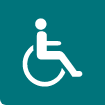
However travelling with CRPS or persistent pain means you have a lot to think about, remember and to do. So, to start with you need to get organised by writing yourself a list of everything that you need and what you need to do using our 10 Tips You Need to Know About Travelling with CRPS or chronic illness as a guide for your list.
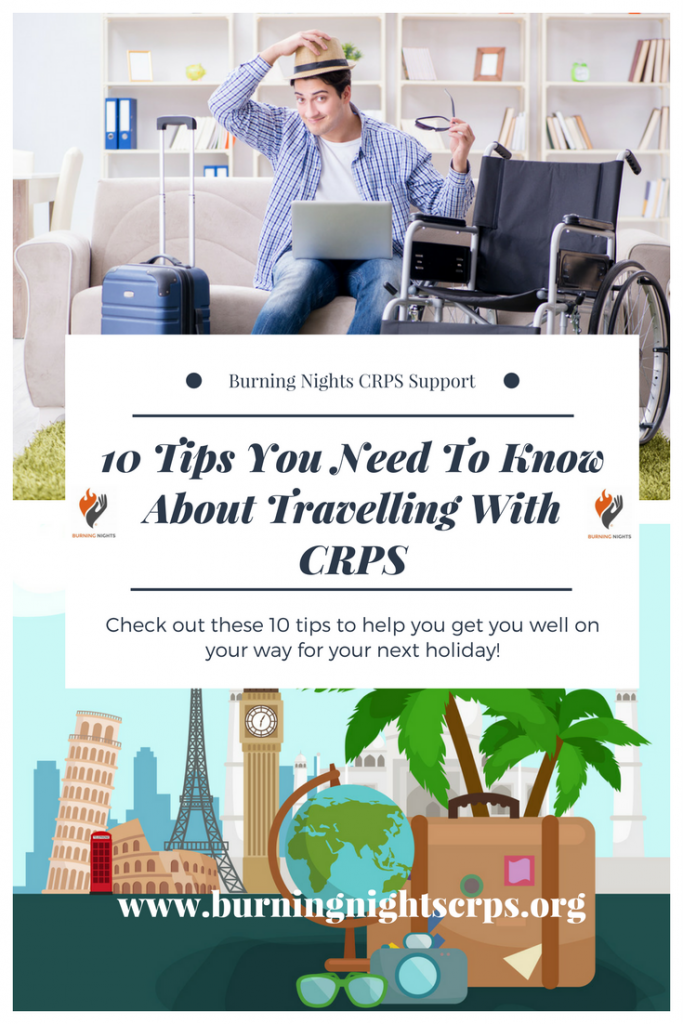
Aways do your research! Research everything from how you’re going to get there, how long it will take to get there, accommodation, the local area ie is it mountainous, close to the sea, how far is it from the airport if you’re flying etc. This research will help you in booking your holiday.
Book Direct With the Hotel or Apartment Complex
There is so much choice now online when you want to go away with comparison websites all wanting you to book with them. But by booking direct with the hotel you can ask more questions about accessibility around the hotel and it’s facilities. This is especially important if you need to use a wheelchair or if you need to use crutches or walking sticks to help you walk with your CRPS.
You can ask to book an accessible room when you speak direct with the hotel, whereas on many of the comparison websites you can’t book an accessible room via online or it may only be a ‘request’ and you’re not guaranteed to be given an accessible room when you arrive.
You can also ask other important questions such as the accessibility of getting to the restaurant, is that a fridge in the room if you have any medication that needs to be kept refrigerated, the latest time for check out in case your flight or you leave late in the afternoon or evening, how close it is to amenities or local attractions or other questions you may have concerning how your CRPS or persistent pain affects your every day life.
It is a good idea to print out your holiday booking whether you have booked your accommodation and flights/car/coach together or separately, just in case where you are going either doesn’t have WiFi or has poor connection or you can’t use your phone when you get there. Note down the accommodation address and telephone number as well as the contact details for your Tour Operator or Travel Agent in case of any urgent problems.
Living with CRPS, chronic illness or persistent pain doesn’t always mean you can’t fly somewhere for a holiday. When you’ve decided where you’re going on holiday, you have to decide how you’re going to get there. Whichever way you are travelling to get to your holiday destination you need to remember to stretch yourself and do some basic exercises so you don’t become stiff or your CRPS symptoms start to flare up.
Flying
If you do decide to fly always try to book a direct flight rather than having to change planes as it is extremely stressful and painful if you have to keep getting on and off planes and walk through massive airports.
When you book your flight you need to let them know if you have problems with mobility and whether you will be taking a wheelchair, scooter or hybrid. You shouldn’t have to pay extra to take your wheelchair or scooter with you and on most airlines you may be allowed to take a certain amount of extra luggage free of charge for your disability.
On aircrafts, if you have a mobility problem you won’t be able to sit in certain rows such as exit rows. This is because exit rows are used in emergencies and you must be able bodied. If you book your seats online please check any important messages about contacting the airline direct to discuss any special requirements.
Also think about the length of time you will be on the plane and that you may need to keep standing up and moving your limbs to ensure you don’t cause yourself more pain. In this case why not sit on the aisle seat? This will allow you to keep standing up to move without disturbing the person sat next to you. When you are on the flight don’t forget to stretch to ensure you keep your blood flow going. Always ask for help if you need it.
Driving
If you are driving to your destination make sure you plan in enough rest stops and any accommodation along the route. Even though this will probably make your overall journey but it will be easier on your CRPS pain levels and your joints. If you are travelling with someone else try and split the driving between you so you don’t become over tired by doing all the driving. If you are renting a car try and ensure you order one with adjustable seating and air conditioning so you are comfortable on your journey. If you’re not going to be a driver but a passenger make sure you pack your car in advance with travel pillows, water, drinks and snacks to ensure you are comfortable and you keep well hydrated. See below to read more about packing.
Train and Ferry Journeys
If you decide to travel by train or ferry to your holiday destination, there are a couple of things you need to consider. Many people have problems sleeping with CRPS or persistent pain so travelling by night on a train or ferry may not be the best thing as there’s no scenery to look at and you may not be able to book a compartment cabin that is suitable for you and your disability needs. So travelling by train or ferry during the day may be the best option for you.
If you are travelling by train or ferry at night then book a cabin or compartment so if you want to lie down to rest or sleep then you are able to do so. If you can’t afford a cabin/compartment or there aren’t any available then choose a seat with leg room. If you’re travelling by ferry then choose and pre-book to upgrade to a section of the ferry with seats that recline.
Also if your train makes stops along the way why not, if you’re able to, get off at the stops and give yourself some fresh air and to stretch yourself better.
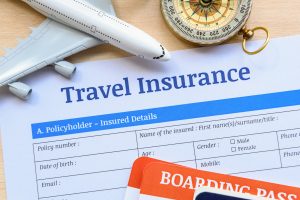 When going on holiday it is imperative that you do purchase travel insurance. You need to do your research as to where you are travelling to. If you are a UK citizen there is the European Health Insurance Card (EHIC card) for travel within the EU. The EHIC took the place of the E111 in 2006. Even though this is a free card if you use the EHIC website, you need to order one or renew it before you travel as you will receive a physical card to take with you. To learn more about the EHIC or to order yours please visit the EH1C website.
When going on holiday it is imperative that you do purchase travel insurance. You need to do your research as to where you are travelling to. If you are a UK citizen there is the European Health Insurance Card (EHIC card) for travel within the EU. The EHIC took the place of the E111 in 2006. Even though this is a free card if you use the EHIC website, you need to order one or renew it before you travel as you will receive a physical card to take with you. To learn more about the EHIC or to order yours please visit the EH1C website.
The EHIC is not a replacement for travel insurance and it is highly recommended that you have both travel insurance and the EHIC. The EHIC only gives you:
(EHIC website)
There are many comparison sites that give you plenty of options. However if you have a pre-existing condition i.e. CRPS then you you may have to contact the insurance company or broker direct. They may want you to go through a ‘medical screening’ process over the telephone. This medical screening is usually a host of questions that you mystery answer truthfully. It is not wise to leave anything out from your answers as this may invalidate your insurance which means if you become ill abroad, the insurance company won’t pay your hospital or medical bills. If in doubt ask the insurance company or medical screening company.
It is best to purchase your travel insurance as soon as you’ve booked your holiday as it will cover you if you have to cancel your holiday later or you have a pre-trip illness.
There are insurance companies specifically for those with pre-existing conditions or disabilities and you should do your research as to which company will be the most appropriate for you and to where you’re travelling to. Travel insurance policies specifically for those with pre-existing conditions such as CRPS are designed in the same way as traditional travel insurance ie for lost luggage, delayed flights etc, but they also cover your pre-existing condition/s.
Remember to take a copy of your travel insurance with you and make a note of any important phone numbers and policy numbers.
3. MEDICATIONS AND MEDICAL EQUIPMENT
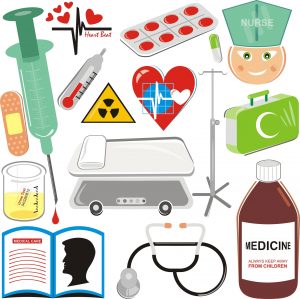
10 Tips You Need to know about Travelling with CRPS | Travelling with Medication
If you have Complex Regional Pain Syndrome or another chronic illness you may have medications that you need to take with you. You must do your research on where you’re travelling to as dome countries have restrictions on narcotics, opioids, anti-depressants and other drugs.
Make sure you order sufficient medication for the duration of your travel and it may be wise to ensure you have a couple of 2-3 days dosage just in case if any travel delays on your return journey home.
Get an extra prescription and keep it in your hand luggage (carry on luggage) when you are travelling. You may be required to show it to Customs or to another official to prove the medication you are travelling with us prescribed to you. If you have the extra prescription you are then able to replace any medication that may get lost or ruined or even confiscated when you reach your destination.
Ensure all your medication is correctly and fully labelled and in their original bottles or boxes as you would get it from the pharmacy (chemist). You shouldn’t mix your medications into different bottles or boxes.
Always carry your medication in your hand luggage to carry with you onto the plane. You don’t want to arrive at your destination to find that your luggage is lost or delayed. If you’re driving to your destination it’s a good idea to keep your medication handy perhaps in the front seat area or glove compartment.
You should also take with you standard medication such as paracetamol, diarrhoea medication, anti-sickness tablets, indigestion medication etc. If you have some already in your home please make sure they are in date. If they have passed their expiration date don’t take them with you but purchase some new instead as the medication may not be as effective and may even harm you. Check with your local pharmacy/chemist about how to dispose old out of date medication properly.
You should get a letter from your GP or specialist explaining you are fit to travel, full details about your condition, the prescribed medication you are travelling with and also any medical equipment you are flying with such as syringes, medical devices such as TENS, SCS, DRG. You can also ask your GP to explain how your CRPS or chronic condition affects you. This letter can be attached to your prescription to keep together.
If you are travelling with more than 3 months supply or you are travelling with certain medications you may need a personal licence. Please visit the NHS website to learn more about taking controlled medicines.
If you are travelling with medication that needs to be kept cold then ensure you have the correct equipment for keeping them cool. If in doubt, speak to your doctor, pharmacist or medical specialist about the best way to keep them cool. Check on the length of time the coolant devices such as ice blocks will last and keep your medication cold.
If you’re flying with liquid medication out of and into the UK you’re entitled to have more than 100 ml ideally put in a clear plastic bag in your hand luggage. When you get to Security for x-rays then you must take out the clear plastic bag with your liquids and show security. They may ask you to open it. This is why it’s important that you have your doctor’s note and prescription handy in your handbag or hand luggage.
If you are flying with syringes you are allowed to carry them in your hand luggage but you must check with the airline you’re travelling with as each of them are different. You must have your doctor include that you’re travelling with syringes, what they are used for and any medication that is used with the syringe. Please visit the Gov UK website for more information about travelling with medical equipment.
4. VACCINATIONS
When doing your research on your destination, you need to find out if you will need any travel vaccinations. Speak to your GP about whether there are any interactions with the vaccinations and the medication you take. There are certain travel vaccinations that are free on the NHS otherwise you may have to pay. Some countries require you to have:
“an International Certificate of Vaccination or Prophylaxis (ICVP) before you enter”
(NHS Choices)
You need to start having your travel vaccinations at least 8 weeks before you travel according to NHS Choices. The Travel Health Pro website is a great resource listing country by country, any precautions you need to take and the necessary travel vaccinations needed
You know your medical information and history however having a brief document prepared before you travel to take with you is extremely important. Take a look at the Burning Nights CRPS Support’s chronic illness dog tag USB or the CRPS USB. These USBs are great to purchase, fill in and take with you. You can also print out the information that you include on the USBs.
You need to gather together and include the following information:
If you are travelling to a country that doesn’t speak English, it may be a good idea to translate your Health Information Document into the language of the country you’re going to or at least your diagnoses, medication and allergies. Remember to print out this Health Information Document and keep a copy with you.
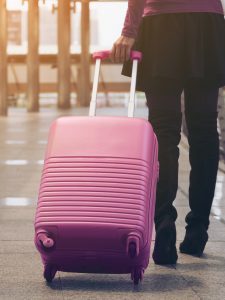
Buying yourself a strong suitcase with 4 wheels will help you when you travel. It will cause you less pain by using the wheels instead of carrying heavy bags. Choosing to purchase a suitcase with 4 wheels instead of 2 will make things easier when travelling. The 4 wheels mean less pulling and tugging therefore causing you less strain on your back and other muscles.
As part of your list that you have written for everything that you need for your trip as well as the things that you need to do, you can write a list specifically for your packing. When you pack the items on your list, don’t forget to tick off the items on your list, so you don’t have to remember if you’ve packed an item or not. This is especially helpful if you suffer with CRPS brain fog.
You should pace yourself when packing, so make sure you start your packing early enough to allow you to take sufficient breaks to rest yourself and not cause too much extra pain before you travel. If you try and pack the day or night before not only will this cause you stress, it can also increase your pain levels which isn’t good right before you travel. Stress also causes more pain. Check out our Quick Guide to Pacing for CRPS & Persistent Pain blog
When making your list and packing your clothes, do your research about the weather in the place you are travelling to. You also need to think about how your CRPS, persistent pain or chronic illness affects your body temperature. For example your CRPS may cause you to sweat more so make sure you have clothes that keep you cool. If you plan to do any sightseeing remember to pack sensible and comfortable shoes as well as your usual flip-flops or sandals. Your feet may well swell up not only on the plane or in the car but also when you are on holiday especially if where you are going has hot weather. So make sure you pack shoes or sandals that can accommodate your swelling feet.
If you are travelling by car to your holiday destination, packing your car ahead of time along with your luggage is a good idea. Ask someone to help you pack the car especially for the heavy items. Pace yourself when packing either the car or luggage so give yourself plenty of rest periods, don’t be tempted to pack everything up in one afternoon or evening.
Packing in both your hand luggage and your car, items such as wet wipes, bottles of water (remember the restrictions of carrying liquids through airport security), tissues, snacks and a small first aid kit is important for any last minute issues. If you are travelling by car make sure you have some plastic bags, roll of kitchen paper towels and tissues is a must especially if you or anyone in your party is sick during your trip. The plastic bags are a good idea so you can put your rubbish, used tissues etc in the bag to just pick up and put straight in the bin when you reach your destination or a service station. This will negate the need to search through the car emptying out any rubbish there may be. Not only will it save you time but also save you having a pain flare up.
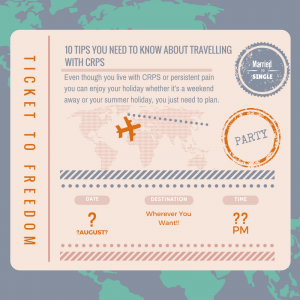
Most likely you will be travelling with your mobile phone so don’t forget your in-car phone charger and keep your phone charged just in case of emergency. Don’t always rely on Google Maps to help you drive your way to your holiday destination, instead take along a map of the country or countries you are travelling through.
Taking along travel u-shaped pillows and blankets are good to help you be comfortable in the vehicle. Blankets are important not only if your CRPS causes you temperature changes as well as if you get stuck somewhere waiting in the cold for breakdown to arrive.
Research the country you are driving to in terms of any specific driving conditions that need to be adhered to. Carrying items such as hi-visibility jackets, triangles, first aid kit, torch, country stickers on the car, copy of your driving licence, copy of your passport, your vehicle insurance etc are just some of the items some countries tell you that you must carry in the car. The RAC have a checklist that you can use if you are travelling within Europe depending on which country or countries you are travelling in.
Before travelling by car to your holiday destination don’t forget to check your car is fully roadworthy. Check the oil level, water for the windscreen, wipers and tyre pressure. Don’t forget to check the spare tyre and its tyre pressure. It may be a good idea to have a set of jump leads with you.
Check your vehicle’s insurance covers you for where you are going and keep a copy of it or the original in the glove compartment to keep it handy. If you are with a vehicle breakdown scheme put the phone number for the breakdown in your phone along with any policy or membership numbers. If you’re not sure whether your vehicle insurance covers you for breakdown phone your insurance company or check your bank account as some bank accounts come with free breakdown cover. If you don’t have any breakdown cover, consider purchasing it for your trip especially if you have problems with your mobility which could give you problems if you had to change a tyre.
When you are working out the directions to your destination when travelling by car remember to factor in plenty of rest stops and breaks, to give your body a break from the vibrations of the vehicle especially if vibrations have an effect on your CRPS, to take your medication and to also stretch your body and joints.
Before you leave on your fantastic holiday it’s a good idea to tell your friends and/or family where you are going, where you’re staying and any important contact details they may need to know. While you’re away if you’re moving to different places or even countries keep your family/friends updated so they can get hold of you in an emergency.
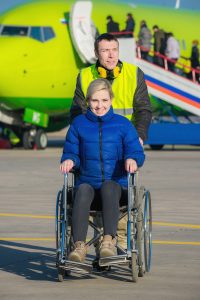
If you are flying to your destination, you may have already pre-booked the best seat for your CRPS, persistent pain and/or disability and also informed the airline that you are travelling with any mobility aids.
If you are flying out of any UK airports either before or after you’ve checked in you need to speak with the disability assistance staff at their desk for the airport. If you require any extra assistance due to a disability, illness or reduced mobility then you are fully entitled to it under European Law.
The staff dealing with people with disabilities or ‘Persons with Reduced Mobility’ (PRM) will take all the details of your flight, your seat number and what sort of assistance that you require. If you need to use the airport wheelchair and you’re travelling on your own the assistance company can help you by pushing you through the security or if you are travelling with someone and you need to use the airport wheelchair, the person you’re with can always push you through security. If you have your own mobility aids and you don’t need any support from the assistance company apart from getting on the aircraft then you just need to book in with them and then will need you at the gate.
Most airlines now allow you to check-in a few days before your flight so when you get to the airport if you only have carry-on luggage then you can go straight through to Passport Control and security. Or if you have hold luggage then there are usually designated desks to drop off your luggage. If you do check in the usual way at the airport, please remember to let the staff know about any liquid medications you are travelling with and be prepared to be asked about your mobility. Depending on where you are travelling and on which airline will depend on whether you have to show your Doctors’ letter to the airline staff. This is why it’s a good idea not only to have a Doctors’ letter explaining your condition but to also keep it handy.
If you haven’t already pre-booked your seats then explain where you’d like to be seated that will be suitable for your mobility, persistent pain and Complex Regional Pain Syndrome.
If you are travelling with others no matter how you are getting to your destination, tell the others about your condition(s) and how it all affects you. Tell them where your Health Information Document is if you become too ill to find it yourself. It’s a good idea to explain what they need to do to help you in event of an emergency. This will help your travelling companions if something does happen.
Tell them about your limitations so they won’t feel offended or worry if you have to stay behind to rest while they go out. Remember to ask for help when you need it!
If you are planning on doing any sightseeing while on holiday then you should research, plan and prioritise what you’d like to do and see. Make a list of everywhere you’d like to go or what you’d like to see and choose which are more important for you to see. You could list everything in order of importance. So when you get there you have a plan of where you’d like to go and if you have days where you need to rest instead of sightseeing or you have a pain flare up, you are not missing out as much on the places you really wanted to go.
Don’t overdo your plan! It’s important to incorporate rest days in your holiday as well as sightseeing trips. You need to listen to your body as you will know your levels of pain and other symptoms of CRPS that you may have. So don’t ignore your body’s warnings! Don’t try and keep up with others if you know you can’t.
Finally, after all your planning, pacing and your lists, there’s only one thing left and that is to enjoy your holiday when you get there! Even though you live with CRPS or persistent pain you can enjoy your holiday whether it’s a weekend away or your summer holiday.
Living with CRPS or persistent pain can be difficult and even though you are away on holiday you still have your Complex Regional Pain Syndrome or persistent pain. But going away can be a good thing and can help you recharge your batteries. What are your best tips for travelling with CRPS or persistent pain? Tell us in our comments section below. Don’t forget to share our 10 tips for travelling with CRPS or persistent pain blog!
Written: 21/09/2017
Last Updated: 03/02/2020